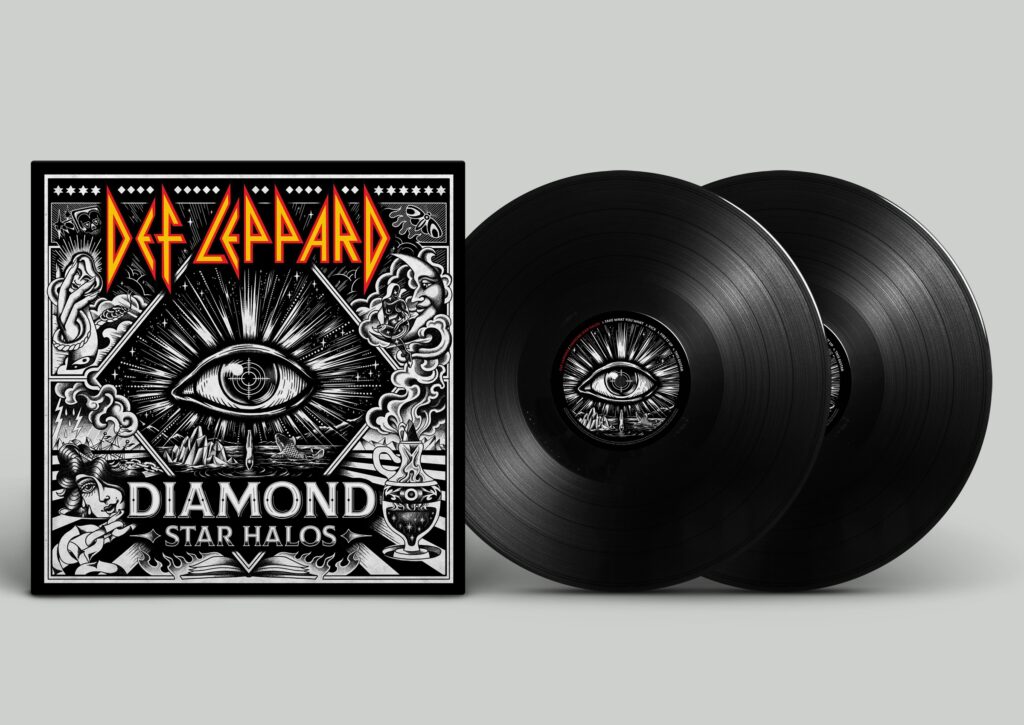It is perplexing. After all this time, I still engage with a new Def Leppard album with impossible expectations, thinking maybe the band will get close to its glory days, even though the albums we know best are largely concoctions of former producer Robert John “Mutt” Lange. (Don’t believe me? Cue up The Cars’ “It’s Not The Night” or Foreigner’s “Woman in Black” and we’ll exchange notes.)

Even more, the band itself rejects the trappings of its hard rock past, at least verbally, leading to a sort of cognitive dissonance when you listen to their latest. So it was with the band’s eponymous 2015 album, and so it is with the latest, Diamond Star Halos, where the band pays homage to itself in subtle ways while outwardly rejecting it by mouth. Opening track “Take What You Want” mimics “Rock Rock (Til You Drop)” from its career-making third album Pyromania. It works far better than the clunky “Fire It Up” which attempts a deja vu mindtrick to make you hear “Pour Some Sugar On Me,” and not succeeding. Namedropping the occasional old song title through the album – ahem, ‘white lightning’ – doesn’t sound nearly as clever as some thought it would.
Working once more with longtime collaborator Ronan McHugh, the record sounds sufficiently big, given it was formulated through the peak of the COVID-19 outbreak, with files flying all over the world by email. However, as has been the case for some time now, McHugh is not a strong editor and probably doesn’t have the standing to tell the band “no” when it needs to be said. The standard edition of Diamond Star Halos is a bloated fifteen tracks that could have been pared back to two strong EPs, perhaps. More-is-more does no one any favors.

Even if “Take What You Want” is self-referential, it works well enough, as does the following track “Kick,” its glam rock heart lending legitimacy to the record’s title being a nod to T. Rex’s “(Get It On) Bang A Gong.” “SOS Emergency” acquits itself well enough.
But the collection flags and sags when it comes to the majority of the songs. Too many canned rhythm loop openings leading to the full band following after, a trope I could have sworn was dead and buried in the early 2000; too many call-out to rock, to get rockin’, and to being rocked, immediately making the tracks feel dated and out of touch.
And then there is the inclusion of Alison Krauss on two tracks. I do not approach these songs with the same level of bias as some might. I like Krauss, not just with her folk collaborations with Robert Plant, but with her longtime band Union Station. I don’t mind country music if the storytelling core it is known for remains intact. At its best, country music really is folk music with a bit more twang.
At its worst, it’s no more than half-chewed bumper-sticker cliches dripping from a slacked jaw, insisting upon it’s own “realness.” That’s what we get with the lumpy “This Guitar,” which unfortunately continues with the phrase “saved my life.” A collaboration between guitarist Phil Collen and writer C.J.Vanston (probably best known to MusicTAP readers as a production partner on Toto’s XIV album), the tune is saddled with that cheesy phrase repeated earnestly one too many times, a misuse of Krauss’ lovely voice, and a lost opportunity to do something profound with the subject matter. Trying to be a mellower, more positive member of the club that includes Foreigner’s “Juke Box Hero” or Bad Company’s “Shooting Star,” it simply elicits rolling eyes and track-skipping.
The second Krauss inclusion, “Lifeless,” well…the title critiques itself, don’t it?
The real sting of this record is that I feel I am kicking it in the shins for trying to do good. Legacy bands like Def Leppard, or Scorpions, or Journey should not be condemned for trying to make new music. It is far too easy to trot out the endless oldies tour, trying to sing about backseat love with young girls without it now sounding gross and criminal. I will never fault a musical organization for trying and for continuing to create. Sometimes it works out very well. Other times, it seems what is needed is someone outside of the echo chamber to say when something is a bad idea. There are moments on Diamond Star Halos that wink at a better, stronger, shorter release, but they are dwarfed by the sheer volume of times when tunes should have been saved for the fan club only.